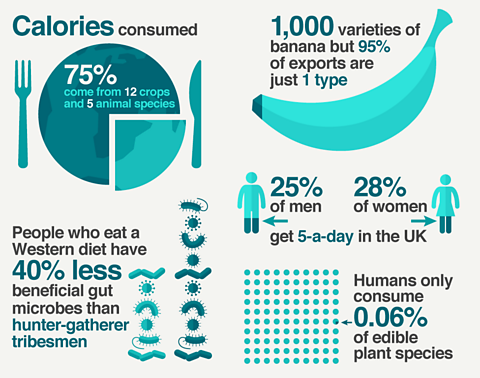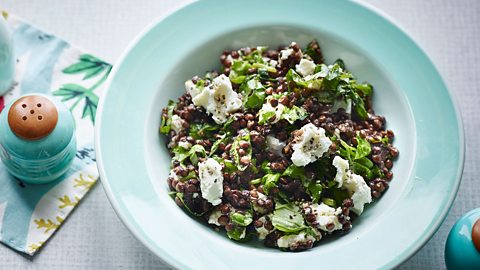How bad for you is a boring diet?
The key to a healthy diet is not cutting out foods, but instead increasing the variety.
Your body contains trillions of microbes, most of which are healthy. The most dense microbe population is in your gut.
A diverse diet means diverse microbes, and research with twins has shown that people with more diverse microbes are slimmer and healthier. This bacteria can predict obesity with an accuracy of more than 90 percent.
If you eat a limited diet and exclude many food groups, research suggests your gut microbes will suffer and you'll have a greater chance of being overweight.
You may think you eat a varied diet, but our hunter-gatherer ancestors' diet was actually twenty times more diverse than ours.
How diverse is your diet?

Can you change your microbial make-up?
Changing your diet can radically alter your microbial make-up. A 2009 study by the Center for Genome Sciences showed that shifting mice to a Western diet changed the structure of their microbiome in just one day.
Similar changes in just a few days have been seen in small diet studies in humans, e.g. 'Diet rapidly and reproducibly alters the human gut microbiome, 2014'.

How to eat a gut-friendly diet
To keep your microbes happy focus on increasing your fibre intake, eating a variety of fruit and veg and avoiding highly processed food.
- Eat fruit and veg at breakfast
- Try topping cereal or muesli with fruit such as bananas and apples, or nuts and seeds. A dollop of live yoghurt contains bacteria that can help your microbes to produce more healthy chemicals.
- If you love toast, try wholegrain bread with veggies such as spinach and mushrooms.
- Snack on nuts and dark chocolate, which contain polyphenols (a group of chemicals that when digested by microbes produce other chemicals that are good for us)
- Nuts are handy to keep in your desk drawer if you're feeling peckish, just make sure you don't eat too many as they're high in calories. A handful is a good portion size.
- Mix up your lunch
- Try different grains, herbs and an array of fruit and veg.
- Swap white bread for wholegrain.
- Spread bread with hummus for fibre and pack in some veg such as spinach.
- Pack in fibre at dinner
- Use pulses such as lentils and chickpeas to pack out salads, soups and stews.
- Eating just one or two portions of green vegetables can up your fibre intake by 7g.